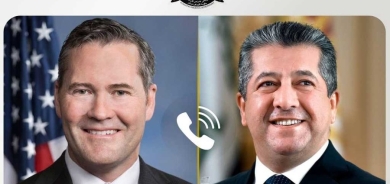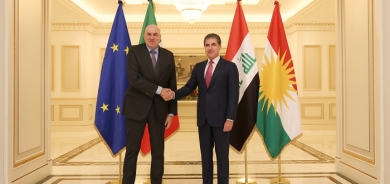Robert Z. Lawrence to Gulan Magazine:We have seen major changes in the move toward democracy that we are still very uncertain as to what form that is going to take
February 27, 2012
Exclusive Interviews

Robert Z. Lawrence is Albert L. Williams Professor of International Trade and Investment, a Senior Fellow at the Peterson Institute for International Economics, and a Research Associate at the National Bureau of Economic Research. He currently serves as Faculty Chair of The Practice of Trade Policy executive program at Harvard Kennedy School. His research focuses on trade policy. The Professor Lawrence has served on the advisory boards of the Congressional Budget Office, the Overseas Development Council, and the Presidential Commission on United States-Pacific Trade and Investment Policy. We contacted the Professor Lawrence to discuss the current situations in the Middle East and he replied to our questions in an exclusive interview to Gulan Magazine as the following:* After the fall of Berlin’s Wall and the collapse of the former Soviet Union, the west declared new world order. The system which supposed to consolidate freedom and democracy everywhere didn’t succeed. The changes in the Arabic countries are not less than the fall of Berlin’s Wall because it also brings democracy to this part of the world. According to your opinion; how the changes will continue?
- Well; it’s a very tough question, certainly we have seen as you indicated major changes in the move toward democracy that we are still very uncertain as to what form that is going to take. It seems to me that the Arab World defining its own political system and won’t exactly look like other part of the world. What is striking in the case of Egypt now is the question of how strong the Islamists will be, how strong Islam will be versus the other kind of deliberate democrats. In the case of Iraq we see different factions, different Sunni versus Shiite and Kurds issue. So I think while we are seeing democracy the specific rules of the game is still being defined in Arab countries.
* The events of the Middle East were not changes only in the ruling system but covers somehow geopolitics of the area, so if we discuss this point in your view to what extend the changes will affect the geopolitical map of the Middle East?
- I think very dramatically one is alignments between Iran and other Shiite versus Sunnis that is one big alignment that is new, we see kind of changes of Turkey and other countries with Sunni leadership rule. We still need to see how the new governments may affect the Palestinian situation so they are major geopolitical changes that may take place but that is all in the state of uncertainty.
* Huntington suggested the theory of clash of civilization in 1991 and afterwards September 11 happened but they didn’t confess it so as not to prove the theory. Again the winning of the Islamic political parties proved that the east doesn’t want the democracy of the west. These are some opinions that are saying many people considered democracy as a product of the west. According to you to what extend do you see that the east may turn to a society against the west?
- Well what is really strike to me is not the clash between the civilizations but the clashes within the civilizations. What very striking looking at the Arab World is the struggles to define what form Arab democracies will take and there may not be just one form. Some will look more like western democracies, some may not. So I don’t think that we are going to see a uniform approach either pro or against the west. I think there are going to be national solutions that reflect conditions that are different in individual countries. so I think we are not living in a very simple world of east versus west. I think there are going to be a variety of governments which are being worked out in the individual countries and they won’t have the same rules of the game just as we see even in the west you know we have a very different system in America than we do in UK or in France. So I don’t see any reason to believe that the way Arab World will evolve will be find itself as against the west. I think it’s going to be a change within civilizations.
* Iraq’s situation is not stabilized so Iraq remains as another eastern station in which US spends 8 years in turning into democracy and secular western friend, nut neither Iraq become democracy nor US policy was successful that Iraqi people do not look at US as their friend. So to what extend west and US are taking lessons from Iraq or what they can learn from Iraq?
- Well I think the biggest lesson is that you cannot determine the other countries political system outcomes. You can help some people you can exert some influence but at the end of the day the sustainable systems will be build form the ground from within and not from outside and I never believed that we could or we certainly cannot make Iraq in the image of the US at the end of the day it’s going to be for the people of Iraq they have to determine their own political system. Some of them will see US as a potential allege some will see as adversary but at the end of the day it’s going to be as the things work out in Iraq. Ultimately and not I think American influence determines the outcome.
* Turkey is a member of NATO and a strategic allege to US but in many situations the Turkish policy doesn’t match the US policy or the western policy for example just like we saw in Libya and currently with Syria. According to your opinion to what extend the contradictions of Turkish policy with US and west harms the interests of US and west in Middle East?
- Turkey used to be a much closer allege of US and clearly Turkish and American policies were quiet similar in particular Turkey had a different relationship with Israel than it does have today. I’m not so sure that in Syria we all that different I mean either Turkey or US are in favor of the current regime in Syria. So there I think we may share some interest even though we have different solutions ultimately but I think we are similar there. The implication of your question is that America can’t dominate and rule the world anymore and event that take place in the Arab World are have been driven heavily by the domestic powers.
* According to some realistic evaluations of the political equation of the Middle East all the fallen regimes of the Middle East were alliance to US also the remaining once like Saudi Arabia and Jordan are alliance to US but either they are upset because the US didn’t helped them when they needed so that makes US only friend in Middle East with Israel. So do you think that having Israel as the only friend in Middle east is enough for US?
- No; not at all, I don’t know we have tensions with Saudi Arabia but we also share a lot of interest with Saudi Arabia. You know that Israel is an important ally for the US but it cannot be some portal for the American interest in the area. I think we still don’t know what kinds of economic policies some of the countries are going to follow. So in the case of Egypt for instance as I think the new governments stop to tackle the most important domestic questions which are increasing jobs and employment for the people they are going to realize that they are sharing interests with the west to a greater degree than you might believe as something through a political dimension.
* Last Question: Do you think that the situation may turn into suspended problems just like the Kurdish question and Palestinian state declarations?
- Well I’m an academic I don’t have to make predictions but I think very likely there are going to be ongoing problems as you pointed to. You know we have Arab Israeli problem so far too long and it’s a real tragedy because I think 90% of the people know what the answer is but the extremists from both side prevents us from getting to the solution and unfortunately I'm not optimistic that it going to be solved in the short run so similarly I think kind of struggles within Iraq about who will run the country and relative powers of interest groups and the struggle within Egypt between the different forces. You know these are going to stay with us for a long time.
Transcription: Mahmud Samih















